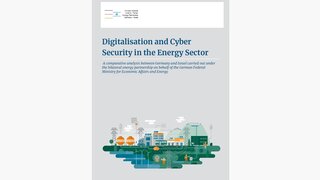Publication of Study on Digitalisation and Cyber Security in the Energy Sector
A comparative Analysis on Digitalisation and Cyber Security in the Energy Sector

The rapid digital transformation of the energy sector is reshaping systems worldwide, creating both opportunities for innovation and new cybersecurity challenges. This study explores how Germany and Israel, with their distinct energy structures and strategies, are navigating these shifts and identifies avenues for mutual learning and cooperation.
The German-Israeli energy partnership has been a valuable source for collaboration since its official establishment in 2022, allowing both countries to leverage their expertise and learn from one another. This cooperation has created a strong foundation for addressing shared challenges in energy transformation.
Building on this partnership, a comprehensive comparative study on digitalisation and cybersecurity in the energy sector was commissioned to analyse the digital transformation of both energy sectors and identify common challenges and opportunities.
Why This Study Matters
Both Germany and Israel are undergoing significant energy transitions, shifting toward decentralized, flexible and sustainable energy systems. This transformation relies heavily on digital technologies like smart metering, AI, and cloud solutions, while simultaneously creating new vulnerabilities that require robust cybersecurity measures.
The study was developed by the German Energy Agency in collaboration with Fraunhofer FIT and IOSB-AST, with experts from both countries contributing insights from industry and government perspectives.
Key Insights
The study also highlights key differences that offer valuable learning opportunities. Germany operates a highly decentralized energy system, while Israel remains largely centralized and isolated as an "energy island." Their cybersecurity strategies differ as well, with Israel favouring proactive, military-informed defences, while Germany focuses on regulatory protections and SME support.
These contrasting approaches provide rich opportunities for mutual learning and cooperation. The study provides a detailed analysis of both countries' current situations, identifies common challenges and opportunities, and offers specific recommendations for policymakers, regulators, and industry stakeholders.
Looking Forward
The research establishes a foundation for deeper German-Israeli cooperation in energy sector innovation. By identifying shared challenges and opportunities, the study opens pathways for joint research projects, technology development, and best practice exchanges.
The findings demonstrate that closer bilateral cooperation, combined with joint pilot projects and standardization efforts, could significantly strengthen both countries' energy system resilience and efficiency as they continue their transitions toward sustainable energy futures.